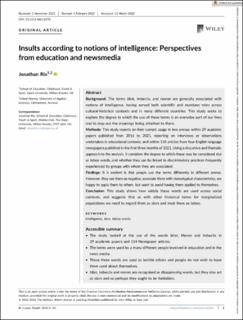| dc.contributor.author | Rix, Jonathan | |
| dc.date.accessioned | 2023-03-03T10:10:11Z | |
| dc.date.available | 2023-03-03T10:10:11Z | |
| dc.date.created | 2022-03-24T12:00:16Z | |
| dc.date.issued | 2022 | |
| dc.identifier.citation | British Journal of Learning Disabilities. 2022, . | en_US |
| dc.identifier.issn | 1354-4187 | |
| dc.identifier.uri | https://hdl.handle.net/11250/3055701 | |
| dc.description | This is an open access article under the terms of the Creative Commons Attribution‐NonCommercial‐NoDerivs License, which permits use and distribution in anymedium, provided the original work is properly cited, the use is non‐commercial and no modifications or adaptations are made.© 2022 The Authors. | en_US |
| dc.description.abstract | Background The terms idiot, imbecile and moron are generally associated with notions of intelligence, having served both scientific and mundane roles across cultural-historical contexts and in many different countries. This paper seeks to explore the degree to which the use of these terms is an everyday part of our lives and to map out the meanings being attached to them. Methods This paper reports on their current usage in two arenas: within 29 academic papers published from 2016-2021, reporting on interviews or observations undertaken in educational contexts; and within 134 articles from four English language newspapers published in the first three months of 2021. Using a discursive and thematic approach to the analysis, it considers the degree to which these may be considered slur or taboo words, and whether they can be linked to discriminatory practices frequently experienced by groups with whom they are associated. Findings It is evident is that people use the terms differently in different arenas. However, they see them as negative, associate them with stereotypical characteristics, are happy to apply them to others, but want to avoid having them applied to themselves. Conclusion This study shows how widely these words are used across social contexts, and suggests that as with other historical terms for marginalised populations we need to regard them as slurs and treat them as taboo. | en_US |
| dc.language.iso | eng | en_US |
| dc.rights | Attribution-NonCommercial-NoDerivatives 4.0 Internasjonal | * |
| dc.rights.uri | http://creativecommons.org/licenses/by-nc-nd/4.0/deed.no | * |
| dc.subject | intelligence | en_US |
| dc.subject | slurs | en_US |
| dc.subject | taboo words | en_US |
| dc.title | Insults according to notions of intelligence: Perspectives from education and newsmedia | en_US |
| dc.type | Peer reviewed | en_US |
| dc.type | Journal article | en_US |
| dc.description.version | publishedVersion | en_US |
| dc.subject.nsi | VDP::Samfunnsvitenskap: 200::Pedagogiske fag: 280 | en_US |
| dc.source.pagenumber | 10 | en_US |
| dc.source.journal | British Journal of Learning Disabilities | en_US |
| dc.identifier.doi | 10.1111/bld.12470 | |
| dc.identifier.cristin | 2012245 | |
| cristin.ispublished | true | |
| cristin.fulltext | postprint | |
| cristin.qualitycode | 1 | |

